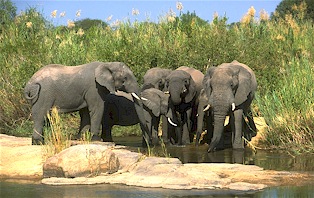Conservationist says climate changes may make elephants, tigers extinct
Mass extiction may be on the way according to Leaky. I don't think humankind cares enough to change. Photos of these great and noble creatures may be all we have left.GONE

NEW YORK: Well known paleontologist and conservationist Robert Leakey says climatic changes in the wake of global warming and decreasing forest cover could threaten the existence of animals like elephants, tigers and the rhinoceroses. It could be larger threat than poaching, he adds.
Leakey, a former director of Kenya's wildlife service, who has convened an environment conference at Stony Brook University, urged the setting up of a new global fund to protect wildlife.
He feels the millions of dollars spent in creating national parks to safeguard animals like elephants and tigers against poaching are going waste. Because, these animals are facing extinction anyway due to the climatic changes. Funds must, therefore, be diverted to research the causes of climate changes and contain the adverse impacts.
He cited computer projections that Africa, home for the symbolic "big five" species of elephant, rhinoceros, lion, leopard and buffalo, is already dry and will become drier and warmer. In usual circumstances, these animals, in the face of such threats, would have migrated. But increased human habitations foreclose any such option for them.
At the three-day seminar at the university, Leakey is attempting to convince representatives of the World Bank and the United Nations Environment Programme to establish a new fund to research the issue and find solutions so that the wildlife is protected from climate change.
"I think we may well be looking at a mass extinction; and I think the question is, can we do anything to adapt to it," he asks.
Leakey had been an activist through his life. He had led an excavation team on the eastern shore of Kenya's Lake Turkana which found nearly 200 fossils, the important find among them being the homo erectus dubbed "Turkana Boy" roughly 1.6 million years old and still one of the most complete fossils ever found.
He was later director of the National Museums of Kenya and director of the Kenya Wildlife Service. He says he is not an expert in climate changes, but he can spot the “inherent complacency in governments around the world" which dismiss climate changes as part of a natural system. He says this attitude must change and change fast.
Keep up with the Signs Of The Times

0 Comments:
Post a Comment
<< Home